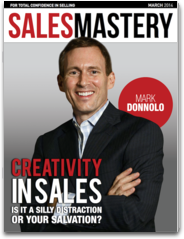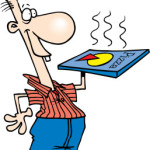Can you think of one action, if you took it more consistently, that would make a huge difference in your sales results?
Wait, don’t answer that quite yet.
Here’s another question. Is there one detrimental behavior that, if you eliminated, would increase the effectiveness of your sales day?
Do you have something in mind for both of these questions? It’s not uncommon when sales groups are asked these questions that we get the response, “What, you only want one for each?” Most of us can stand back, look at our sales activities from beginning to end, and find numerous behaviors and actions that need a tweak.
 As the saying goes, we know what to do but we don’t do what we know. While I’m a big proponent of vigorously improving sales knowledge, I’ve always found that the largest impact in increasing sales results is turning existing knowledge into habits – taking what we already know that we should do, and turning it into action. You see, when push comes to shove, habits trump knowledge every time … especially when the pressure is on.
As the saying goes, we know what to do but we don’t do what we know. While I’m a big proponent of vigorously improving sales knowledge, I’ve always found that the largest impact in increasing sales results is turning existing knowledge into habits – taking what we already know that we should do, and turning it into action. You see, when push comes to shove, habits trump knowledge every time … especially when the pressure is on.
Think about this research finding: As much as 95% of everything we do on a daily basis is controlled by our habits.* Does that statistic take your breath away? It did mine when I first heard it. From the moment we wake up to the moment we go to bed, our habits drive us. (And, for that matter, if you sleep on the same side of the bed every night, your habits are in the driver’s seat for your dreams as well.)
We don’t need things like brushing our teeth, looking both ways before crossing the street or tying our shoes on a “to-do list” because they’re habits. Likewise, many of our sales processes are on cruise-control as well. Even without scripts, we all find a rhythm in our sales presentations and activities – sometimes not to our advantage.
Does that make us robots – preprogrammed to go through the motions of our sales careers and our lives with little choice – or voice – in the matter? Far from it. The fact that we are controlled by habit is a good thing. It’s habit that lets us to deal with much of the necessary discipline and minutia of daily life without giving up a portion of our conscious thought. It’s habit that allows us to get into the “zone” and act with confidence, calmness and control in our sales calls – to be effortless in our execution. It’s habit that frees up our mind to focus on the most important aspects of the sales process (like listening to our client).
If you’ve identified one good sales habit and one bad sales habit from the above questions, it’s time to take control.
But before that, there are some things we must all understand about changing habits:
- Changing habits is hard! If it was just about “knowing” what to do, you’d already be doing it, right?
- Changing habits takes time! You’ll have to invest discipline and repetitionup front to get long-term success.
- Replacing bad habits with good ones is the most worthwhile challenge you can set for yourself!
Let’s look at a variety of steps that, together, form the foundation for the construction of your good habits and the assault on your bad habits. We’ll start with one of the toughest challenges – but one that is absolutely fundamental to the task:
#1: Face The Truth
Even the most highly professional sales people occasionally indulge the ability to tell stories to themselves, to adjust their sense of reality toward what they want to believe, and away from their honest, objective perception of things as they are. In other words – sales people are sometimes delusional!
In testing, sales professionals invariably rate their performance much higher than how others see them and how they stack up compared to their peers. They also tend to reframe sales experiences in order to justify client delays or objections.
Why the disconnect? You probably already know the answer to that one. Even the most successful among us deals with consistent rejection. Telling ourselves stories is a defense mechanism, pure and simple.
Or, not so simple. Unless we face the truth about where we are in our sales careers, how we spend our time, and where we can improve, we’ll never move forward toward establishing habits that stick.
You may have heard the statement “An undisturbed prospect will not buy.” Well, for us to make changes to our habits “An undisturbed sales person will not change.”
#2: Focus On What YOU Do Best
While there are numerous worthwhile lessons to be learned from the examples of others who are successful, establishing your most effective habits will not be accomplished through imitation. Learn the lessons of their examples, but adapt and apply your own unique strengths and abilities, not by trying to “become” them.
This honest assessment and inventory of the things that you do best is crucial to replacing bad, counter-productive sales habits with good, effective ones. The key operative here is YOU.
#3: Have A Clear Vision – And Equally Clear Plan Of Action
When establishing new habits, the WHY is just as important as the HOW. Why is this new habit important to you? What will it mean to you when it’s fully implemented? Why will eliminating this bad sales habit improve your sales career? By attaching your habit to your vision and purpose, you give it energy, direction and power.
Once that direction is secure, you can build upon that with a specific, honest, precise and targeted plan of action. Sales training guru Brian Tracy likes to say that fuzzy thinking leads to fuzzy results, and he’s right.
#4: Seek The Skills And Tools You Need
What’s the one skill you would need to improve in order to put this habit into place? What tools, support and accountability is available to you to make sure that the habit endures? What about your negative habit? Is there a skill or tool that will help eliminate your bad habit?
#5: Find Your Rituals
Rituals can create control in the midst of chaos – and isn’t a sales career a highly chaotic place? We know the power and benefits of ritual during the holiday season, military operations, historical celebrations, weddings and graduations. Rituals protect what’s important to us and remind us of our purpose.
Think about a professional athlete preparing for an activity …. a golfer preparing to putt, a basketball player getting ready to shoot a free throw, a baseball player in the on-deck circle, a tennis player preparing to serve. Rituals are used by athletes to mentally, emotionally and physically get ready for a performance.
What rituals can you find – or create- that will put you in the most effective sales professional mood and mode to enact your new habit? It could be a physical movement or gesture to pump you up, a visualization that prepares you for the sales process ahead, or the release of emotional juices that center you on what’s important … or all three. Rituals should be unique to you and your habit. Just like the athlete, this is your on-deck circle.
#6: Create The Right Environment
To paraphrase Marshall McLuhan, “we first create our environments, thereafter our environments recreate us.” Successful habits endure when our environment supports our mission.
Your desk, your briefcase, your automobile, your presentation materials, your overall approach to organization and demeanor to the sales process should be supportive of your habits. Your environment even includes the team around you, the way that you dress and your home. A great question to ask is, “Is this the office (car, material, team, etc.) that represents my new successful sales habits?”
#7: Find Your Feedback
No matter how independent we feel ourselves to be – and independence/self-starting is one of the qualities a lot of successful sales professionals possess; it also is one of the stories we tell ourselves. Nobody does it alone. And, nobody can do it alone.
We all need feedback, and if we find the right sources for accurate and effective, honest feedback, and open ourselves to it, we become better. Just ask any successful athlete, Special Forces member, doctor or performer how effective he or she would be without a coach, mentor or guide giving targeted, specific feedback.
When trying to change habits, we need to invite feedback in.
#8: Have Fun!
We all know that we perform better if we’re having fun. Putting your “nose to the grindstone” and “gutting it out” may be popular motivational catchphrases, but they have little to do with performing at your best. In order to establish your new habits, you have to find ways to make it enjoyable … that way, you’ll keep repeating the behavior.
If you keep these eight foundational points and practices in mind, creating your new habits and destroying your old bad habits may not be easy, but your chances of making them permanent goes up dramatically. And, what could be better than that? You’ll now be doing what you know … and reaping the rewards.
*The Unbearable Automaticity of Being, American Psychologist, July 1999, John A. Bargh and Tanya Chartrand.
 Originally published in Sales Mastery Magazine (March 2014) To get more great articles on your phone or tablet, download the app today.
Originally published in Sales Mastery Magazine (March 2014) To get more great articles on your phone or tablet, download the app today.
On the Apple Newsstand in iTunes:
https://itunes.apple.com/us/app/sales-mastery-magazine/id719883123?mt=8&uo=4&at=10lnPh
In the Google Play Store:
https://play.google.com/store/apps/details?id=com.bdiahhfbbd.hccbdiahhfbbd
 Performing at your best in sales requires that you take control of your mind. We all know that a confident, optimistic mind-set is a key ingredient to us reaching our top performance. Yet many salespeople, aided by a fast-paced, high-pressure business environment undermind themselves with negative talk and pessimistic thinking.
Performing at your best in sales requires that you take control of your mind. We all know that a confident, optimistic mind-set is a key ingredient to us reaching our top performance. Yet many salespeople, aided by a fast-paced, high-pressure business environment undermind themselves with negative talk and pessimistic thinking.





